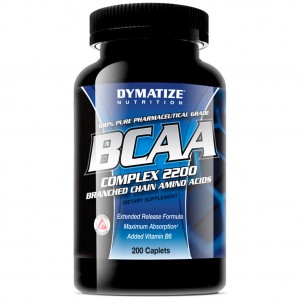by Livia Ly. For those who don’t know exactly what Branched Chain Amino Acids (BCAAs) are, here you  go: they include the amino acids valine, leucine and isoleucine. They are part of the family of essential amino acids in which leucine plays the key role in promoting muscle protein anabolism, or synthesis. For those who are active and looking to increase performance and perhaps muscle mass, BCAAs may be worth taking. Here’s the short story of how the BCAAs might act as an ergogenic aid. During prolonged exercise, plasma tryptophan (another amino acid) rises resulting in feelings of fatigue. Research, however, shows that if you consume BCAAs, it may compete with free tryptophan; thus reducing your perception of fatigue. The result is that less tryptophan goes to your brain, you get less fatigued, and experience higher performance! Interesting…The effective dose is ~5 to 20 g. This can still be easily reached with protein-rich foods; however, the data on BCAAs regarding its ergogenic properties are on the three amino acids as a stand-alone supplement (not as part of a food).
go: they include the amino acids valine, leucine and isoleucine. They are part of the family of essential amino acids in which leucine plays the key role in promoting muscle protein anabolism, or synthesis. For those who are active and looking to increase performance and perhaps muscle mass, BCAAs may be worth taking. Here’s the short story of how the BCAAs might act as an ergogenic aid. During prolonged exercise, plasma tryptophan (another amino acid) rises resulting in feelings of fatigue. Research, however, shows that if you consume BCAAs, it may compete with free tryptophan; thus reducing your perception of fatigue. The result is that less tryptophan goes to your brain, you get less fatigued, and experience higher performance! Interesting…The effective dose is ~5 to 20 g. This can still be easily reached with protein-rich foods; however, the data on BCAAs regarding its ergogenic properties are on the three amino acids as a stand-alone supplement (not as part of a food).
So are there benefits for weight trainers?
Yep. BCAA supplementation before/after exercise may help with the muscle pain and damage that you get from lifting all that weight. Plus, it may promote muscle building, especially if you are brand new to the weight lifting world. Besides, BCAA supplementation before exercise may also help slow down the breakdown of muscle during exercise; also, there is some good data showing that BCAAs can reduce DOMS or delayed onset muscle soreness. However, of the three BCAAs, leucine may be the most important.
Why leucine?
Significant decreases in blood leucine occur after aerobic (11 to 33%), anaerobic lactic (5 to 8%) and strength (30%) exercises. New research from Brazil done by Humberto Nicastro and colleagues, published in March 2014, showed that BCAA/leucine and HMβ are effective supplements in the lessening of muscle damage that is caused by exercise. By the way – hydroxy-methyl butyrate, or HMβ, is formed via leucine.
I interviewed Dr Nicastro, who is a dietitian in Brazil and coordinator of the VP Research Institute, and asked what he recommends for pre/post exercise in terms of BCAA and leucine. “An adequate amount of protein guarantees the maximum threshold of leucine in the blood. So if you opt for proteins, there is no need to combine with leucine. Although there may be a small advantage over the low protein content of leucine (casein, soy, rice). But even so, if the total dose is corrected for the content of leucine, the effect is comparable,” he said. Dr Nicastro finalized his recommendations by saying “I recommend BCAA/leucine or protein for pre-workout to ease muscle damage during training and for after training to increase muscle synthesis.”
Alright, let’s summarize. Here are my four must-dos:
1- Before exercise. Eating 3 to 6 g of essential amino acids before exercise may help you minimize muscle damage and breakdown.
– Whey: just so you know, about 25% of all whey protein is made up of BCAAs, which is a substantial amount.
2- Don’t forget your post-workout snacks! BCAAs work best building up your muscles when you include them with foods that are rich in protein and carbohydrates after your exercise.
3- Leucine at each meal. It’s recommended to eat at least 2 g of leucine with each meal, or a minimum of 8 g per day.
– Whey contains 10% of leucine. If you drink a shake with 25 g of protein, you will be getting 2.5 g of leucine.
4- BCAAs for your endurance exercises. For those of you who love to exercise for long periods of time – you need to eat 6 to 10 g per hour of BCAAs with sports drinks, so you can delay that fatigue that keeps bothering you.
References
- Balage M, Dardeveta D. Long-term effects of leucine supplementation on body composition. Curr Opin Clin Nutr Metab Care. 2010,13:265–270.
- Bishop D. Dietary supplements and team-sport performance. Sports Med. 2010,40(12):995-1017.
- Campbell B et al. International Society of Sports Nutrition position stand: protein and exercise. J Int Soc Sports Nutr. 2007,4:8.
- Da Luz C et al. Potential therapeutic effects of branched-chain amino acids supplementation on resistance exercise-based muscle damage in humans. J Int Soc Sports Nutr. 2011,8:23.
- Kreider RB et al. ISSN exercise & sport nutrition review: research & recommendations. J Int Soc Sports Nutr. 2010,7:7.
- Mero A. Leucine supplementation and intensive training. Sports Med. 1999,27(6):347-358.
- Nicastro H et al. Are the bcaas/leucine supplementation effects on exercise-induced muscle damage related immunity response or to Hmβ? J Nutrition Health Food Sci. 2014,2(2):1-3.
- Nicastro H et al. Does branched-chain amino acids supplementation modulate skeletal muscle remodeling through inflammation modulation? Possible mechanisms of action. J Nutr Metab. 2012 (2012).
- Pasiakos SM, McClung JP. Supplemental dietary leucine and the skeletal muscle anabolic response to essential amino acids. Nutr Rev. 2011,69(9):550–557.
- Sharp CP, Pearson DR. Amino acid supplements and recovery from high-intensity resistance training. J Strength Cond Res. 2010,24(4):1125-30.
- Shimomura Y et al. Nutraceutical effects of branched-chain amino acids on skeletal muscle. J. Nutr. 2006,136:529S–532S.
- Symons TB et al. Aging does not impair the anabolic response to a protein-rich meal. Am J Clin Nutr. 2007;86:451–6.
- TeamUSA.org. Branched chain amino acids, 2010. At http://bit.ly/1mvdtwC
- Volek JS. Leucine triggers muscle growth. Nutrition Express. At http://bit.ly/1jNm3Dv
I’m a health enthusiast.
I’m a dietitian trained in Brazil.
I’m a nutrition grad student in Chicago.



